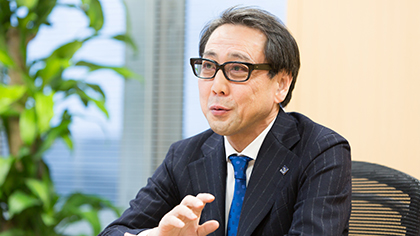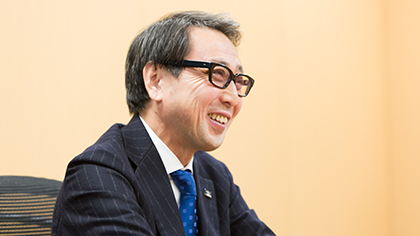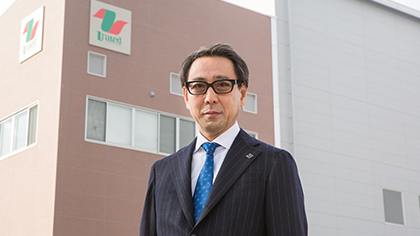-


What inspired you to undertake the biomass power generation project?
I also serve United Corporation as president, and this company operates a waste treatment business. We make use of heat generated by burning waste to privately generate electricity to be consumed within our premises. In view of the FIT scheme coming into effect in 2012, I thought that my knowledge and experience may be used for biomass power generation. At first, I simply thought that biomass power generation would be just a slightly larger version of private power generation. However, my calculation made me realize that it was difficult to make ends meet. It had to be larger than I had expected and the ratio of unused material from within the prefecture had to be higher, but it was by no means possible to secure this volume of material. I thought that it was a tough challenge.
How did you overcome it?
When I visited the Forestry and Lumber Industry Section of the Agriculture, Forestry and Fisheries Department in the Akita Prefectural Government, there happened to be a vice minister for engineering affairs dispatched from the Forestry Agency. He was so enthusiastic that he visited foresters across the prefecture with me. As I visited one forester after another together, I learned that the forestry industry in the prefecture had been more mechanized than expected and that that had resulted in a large number of young successors taking over businesses. They were keen to invest in projects that would attain profitability in a decade or two. I thought that the biomass power generation business would then be viable. The building of these human relationships led to a breakthrough.
-


How did the partnership with RENOVA begin?
I met RENOVA when we worked closely together for the treatment of industrial waste near Sendai Port, which had been affected by the Great East Japan Earthquake disaster, at the plant of United Corporation. As I look back now, the relationship was built in an unusual way. As the requirements for the biomass business emerged, the partnership with RENOVA began to advance. We had relationships with foresters, plants and local capital and RENOVA was strong in financing, project planning and legal affairs. The two parties complemented each other to develop a very good scheme. I think that RENOVA’s advantage lies in that it is a company that is growing now, unlike major trading companies. Both friendly and strict, RENOVA is a significant partner that I feel helps us grow together. In addition, RENOVA endeavors to move forward together with the local community and respects local people and businesses. I believe that is why we were able to work together.
-


Your enthusiasm has brought URE’s biomass business into being. What is its significance to the local community?
It contributed to the revitalization of existing businesses, energized physical distribution and the Akita Port and created jobs. In particular, foresters throughout the prefecture provided support for us and chip factories were built at different locations in the prefecture. I was delighted with that. In addition, enthusiastic foresters are thinking of planting fast-growing trees between cedar trees for the purpose of biomass power generation. It is an unprecedented move. At first, it could have been a thoughtless venture but with the help of the Akita Prefectural Government and Governor, the vice minister for engineering affairs, forestry operators, banks and many others, we succeeded in launching a new business with regional origins that has had impacts all over the prefecture. I will be delighted if more people understand that even a small business can make a big achievement like this.
What is your notion about renewable energy business?
The renewable energy business is key to building a sustainable society. Under the FIT scheme, consumers are obliged to pay a surcharge. Even so, a highly profitable infrastructure business is run solely with money and energy from the private sector. I think this should be more highly regarded. I hope that RENOVA will demonstrate that renewable energy is a worthy business by attempting an even greater venture in the future.
* Affiliates and titles etc. of the interviewees are current as of the time of the interview or publication.


